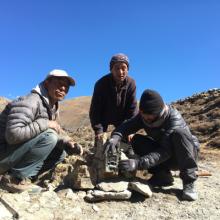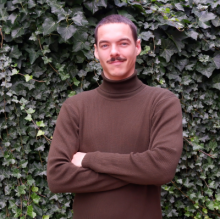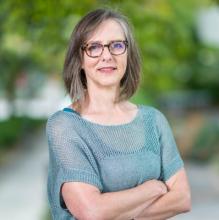Being a Public Scholar means conducting research that genuinely matters to the people and environments it touches. It is about stepping beyond traditional boundaries to make a tangible difference in society. I see it as a chance to work hand-in-hand with local communities, conservation practitioners and policymakers, collaborating to solve real-world problems together.
Research Description
My research explores the socio-ecological interactions between wildlife, specifically large carnivores like snow leopards and wolves, and livestock producers in Shey Phoksundo National Park, Nepal. Livestock predation by carnivores presents significant challenges for local herder communities, which are among the poorest in Nepal and depend heavily on cattle rearing for their livelihood. These conflicts threaten both wildlife conservation efforts and the socio-economic well-being of the herders. Existing interventions, such as compensation schemes, have had limited success because they fail to address the root causes of conflict, which stem from the complex socio-ecological systems that shape human-carnivore interactions. My research aims to bridge this gap by integrating local ecological knowledge of herders with scientific ecological data on carnivore behavior and distribution. Using a participatory action research approach, I will work closely with herder communities and park agencies to co-design interventions that are informed by both local practices and ecological insights. This interdisciplinary work will include interviews, community workshops and the use of tools like remote camera traps to track carnivore populations. By combining social and ecological data, we will also develop livestock predation risk maps that help herders make informed grazing decisions, reducing the likelihood of carnivore attacks. The ultimate goal is to develop locally relevant, scientifically grounded conservation strategies that empower communities, mitigate human-wildlife conflict and contribute to the conservation of iconic species like snow leopards and wolves.
What does being a Public Scholar mean to you?
To me, being a Public Scholar means conducting research that genuinely matters to the people and environments it touches. It is about stepping beyond traditional boundaries to make a tangible difference in society. I see it as a chance to work hand-in-hand with local communities, conservation practitioners and policymakers, collaborating to solve real-world problems together. Specifically, it allows me to develop practical solutions to the human-wildlife conflicts that deeply affect herder communities in Nepal. Public Scholarship is where rigorous academic research meets socially engaged, impactful work. It’s about making sure that my research doesn’t just stay on paper but becomes something that can be put into action to serve the greater public good.
In what ways do you think the PhD experience can be re-imagined with the Public Scholars Initiative?
Doctoral education often focuses on preparing students for academic careers, with research that aspires to societal impact but sometimes gets lost in theoretical frameworks and technical jargon, limiting its real-world effectiveness. The Public Scholars Initiative (PSI) re-imagines this experience by offering vital support that allows students to broaden their research scope and tackle societal challenges through interdisciplinary, stakeholder-engaged projects. PSI encourages students to break away from traditional academic silos, fostering collaboration with diverse partners and making research more dynamic, innovative and relevant. By including non-traditional outputs like policy papers, community-based initiatives and public-facing scholarship, PSI helps make the PhD journey more meaningful and prepares scholars for both academic and non-academic career paths. For my research specifically, this re-imagining allows my collaborators — local cattle herders and the national park agency — to co-develop the research with me. It changes the PhD from a solitary endeavor into a shared, interdisciplinary effort that truly makes a difference. Together, we’ll create practical outputs that help resolve human-wildlife conflicts in Nepal. This collaborative approach exemplifies the spirit of PSI, embracing action-oriented research that addresses real-world problems. By working closely with stakeholders and producing scholarship that serves both the academic world and the public good, I believe this approach shows the true potential of a re-imagined PhD to effect positive social change.
How do you envision connecting your PhD work with broader career possibilities?
Through my experience as both an independent researcher and a conservation practitioner, I’ve seen how science and practical conservation efforts can often be disconnected. My PhD work seeks to bridge that gap by integrating conservation science with community engagement, opening up opportunities in both academic and non-academic career paths. I envision working at the science-policy-practice interface with government agencies or conservation organizations, where I can contribute to the development and implementation of wildlife management strategies. The interdisciplinary nature of my research equips me with valuable skills in policy development, ecological monitoring and stakeholder collaboration, making me well-prepared for diverse roles. Additionally, the communication and leadership skills I develop through public scholarship will prepare me for leadership roles in conservation practice and policymaking.
How does your research engage with the larger community and social partners?
My research actively engages local herder communities and government agencies through participatory action research. By involving community members in the data collection process — such as participatory mapping, interviews and workshops — we co-create knowledge that is relevant and actionable. The collaboration with national park agencies ensures that the research findings inform policy and conservation strategies at a governmental level. This stakeholder-driven approach strengthens trust between researchers, practitioners and local communities, and ensures that the solutions we develop are socially acceptable, locally relevant and effective in mitigating human-wildlife conflict.
Why did you decide to pursue a graduate degree?
While working as a conservation officer for Nepal’s National Park Agency, I was tasked with developing programs to reduce human-wildlife conflicts. During this time, I witnessed the severe impact of wildlife on livestock-dependent families and the retaliatory killings of endangered species like snow leopards and wolves. These experiences deeply influenced my understanding of the complex and intertwined relationships between people and wildlife and motivated me to seek sustainable, long-term solutions that could benefit both. I quickly realized that effective solutions to human-wildlife conflict must be grounded in a comprehensive understanding of both the social and ecological aspects of the system. Moreover, these solutions need to be co-created in collaboration with the communities directly impacted by the conflict. This realization inspired me to pursue a graduate degree, as it would provide the perfect platform to engage in collaborative research, explore interdisciplinary approaches to conservation, and build the skills necessary for a more impact-oriented career in conservation science. My PhD journey represents more than just academic growth — it’s a chance to develop advanced research methodologies, engage with international scholars and conduct fieldwork that has a tangible effect on conservation efforts. I’m committed to demonstrating that a PhD can go beyond traditional academic boundaries to make a real-world difference if approached with the right interdisciplinary mindset. This path allows me to push the boundaries of knowledge while engaging with the public, influencing policy, that will benefit both wildlife conservation and the communities that coexist with them.
Why did you choose to come to British Columbia and study at UBC?
The University of British Columbia (UBC) stood out to me as the ideal place to pursue my graduate studies for several reasons. UBC’s strong commitment to sustainability and its global reputation for excellence in conservation science were crucial factors in my decision. I was particularly drawn to the Institute for Resources, Environment and Sustainability (IRES) because of its interdisciplinary approach and focus on applied, problem-oriented research. It was important to me that my work not only advance academic knowledge but also contribute to solving real-world problems, especially those related to human-wildlife conflicts. I found a perfect fit in the Gaynor lab, where I could pursue research that integrates social and ecological perspectives while maintaining a balance between curiosity-driven exploration and practical impact. The opportunity to study in such a diverse and collaborative environment, where interdisciplinary research is encouraged, aligned perfectly with my goal of developing solutions for human-wildlife coexistence. Additionally, UBC’s Public Scholar Initiative (PSI) greatly resonated with my desire to engage in socially impactful research that extends beyond traditional academic boundaries. The PSI’s support will allow me to work closely with communities and conservation practitioners in Nepal, co-creating practical solutions through interdisciplinary research. This approach ensures my work remains relevant and meaningful, contributing directly to the public good and helping to resolve critical conservation challenges.





